Analysis of mistakes in growing: why carrots are bitter and how to prevent this
Sometimes, even if the rules for growing carrots are followed, bitter roots appear on the site. There are many reasons for this phenomenon: from the wrong variety and insufficient moisture to the wrong soil and pest exposure.
From the article you will learn why carrots are bitter and how to prevent bitterness.
The content of the article
Causes of the bitterness of carrots
Carrots become bitter or lose their taste altogether, not only during cultivation, but also after harvest. Therefore, vegetables are provided with suitable conditions for cultivation and storage.
Bad soil
One of the reasons for the change in taste is the soil that is not suitable for carrots. With high acidity or an excess of alkalis, a lack of nutrients, the development of root crops is disrupted. A heavy, clayey substrate is also unsuitable, as a surface crust often forms on it, preventing the ingress of oxygen and creating a barrier to the even distribution of moisture.
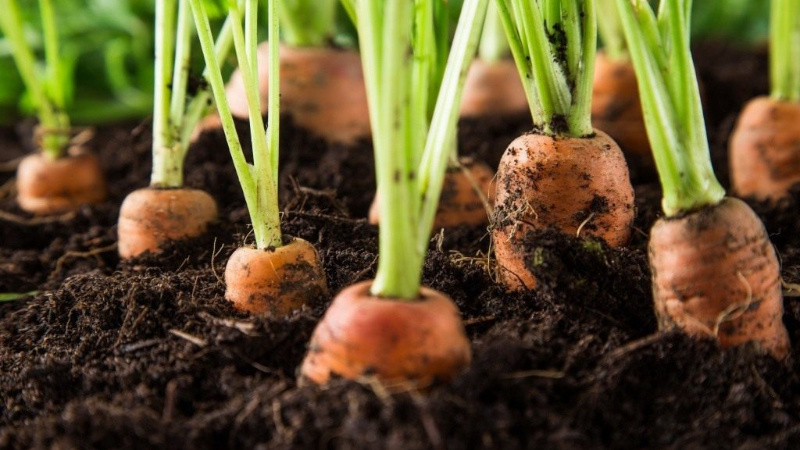 At high acidity, many nutrients are converted into a form inaccessible to plants. Certain types of beneficial bacteria living in the earth die. If the acidity exceeds 7.5 pH, the culture completely ceases to absorb iron, and this is primarily reflected in the taste of vegetables.
At high acidity, many nutrients are converted into a form inaccessible to plants. Certain types of beneficial bacteria living in the earth die. If the acidity exceeds 7.5 pH, the culture completely ceases to absorb iron, and this is primarily reflected in the taste of vegetables.
Important! For carrots to be sweet, they need enough potassium. Phosphorus is required to keep the roots tender.
For an even distribution of nutrients and oxygen access to the roots, the soil around the tops is regularly loosened. Liming reduces soil acidity.
Pests
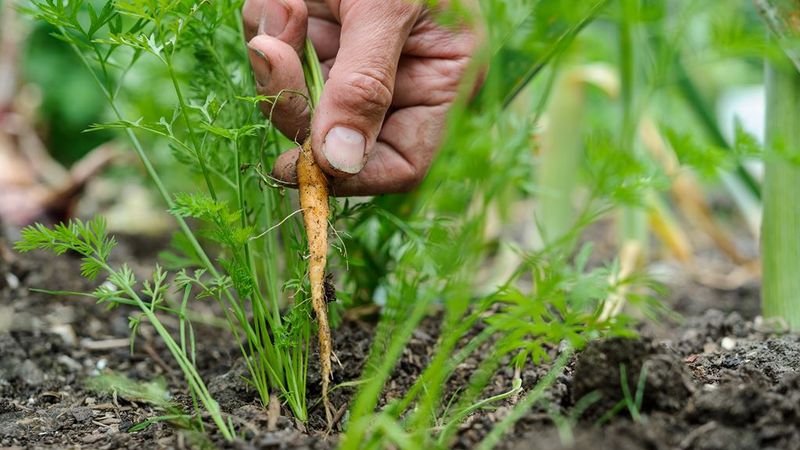
Some pests make root vegetables practically unsuitable for consumption and storage.
Most often, on the site appear:
- Beetles - small insects that actively destroy almost all plantings. Grass fleas feed on the juice of the tops, as a result, it completely dries up, the growth of the culture stops, photosynthesis stops. If the defeat occurred after the formation of root crops, they will taste bitter.
- Carrot flies - appear in the upper layers of the soil and on the surface with the onset of stable heat. At the same time, the tops acquire a bronze tint and gradually fade.
- Umbrella moth larvae - destroy both root crops and seeds. Signs of their presence are cocoons left after pupation.
- Wireworms - yellow worms 2-3 cm long, which feed on the root part of the carrot and leave behind thin passages. This provokes the development of the fungus inside the root crops and their complete rotting.
- Slugs - appear only at night, leaving behind shiny white traces.
Often, the site is also attacked by carrot aphids, destroying the tops. In this case, the leaves quickly fold and dry out, the formation of root crops is disrupted.
Wrong watering regime
Carrots acquire a bitter aftertaste due to lack of moisture. From dry soil, root crops do not absorb nutrients and trace elements, do not accumulate juiciness. Cold water is also contraindicated in culture.
Soil moisture should be at least 50%. In dry weather, plantings are watered intensively, in rainy weather - as the soil dries out. Maximum moisture is required at the beginning of the growing season.
Bad variety and seeds
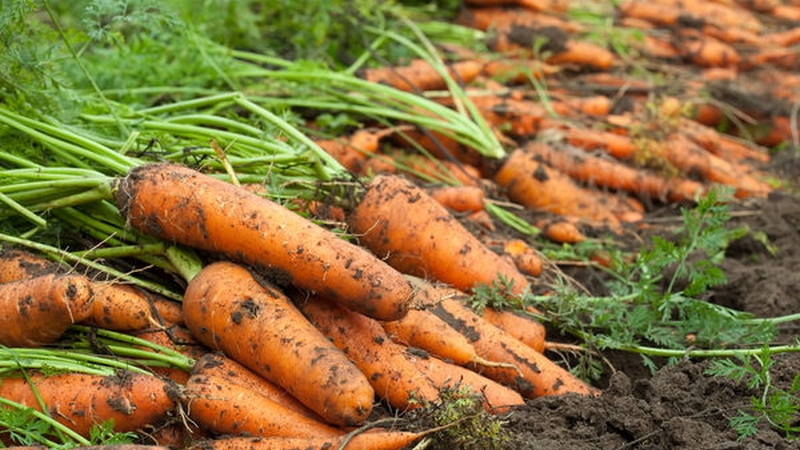
Bitterness in carrots occurs when sowing dates are violated... For example, planting too early leads to overripening, which affects both the presentation of the crop and the taste. Inexperienced summer residents are in no hurry to dig up root crops so that they grow up even more. On the packaging with seeds, it is important to carefully read the instructions, observe the planting and harvesting dates, taking into account the degree of ripening.
Important! Hybrids are only suitable for single seed growing. The subsequent collection of planting material will result in the appearance of bitterness, loss of taste and nutritional qualities of carrots.
When choosing a variety, they are guided by the characteristics provided by the manufacturer, the amount of total sugar in root crops, climatic regions suitable for growing. Vegetables destined for cooler areas will be bitter and small in size in southern latitudes.
Late and early harvest
In the hope that the roots will grow even more, many gardeners are late with the harvest.Harvesting carrots too late is not allowed: vegetables are overrooted, overripe, lose almost all nutrients and become tasteless, bitter and tough.
Prematurely dug carrots are not suitable for storage: they are too vulnerable to fungal diseases. The resulting bacteria feed on carbohydrate compounds, which leads to the appearance of bitterness.
Why are carrots bitter during storage
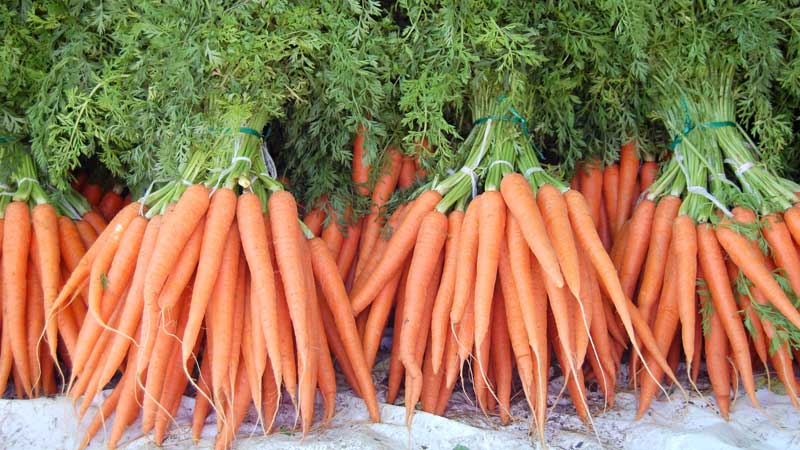
Proper storage conditions for the harvested crop are the key to its good taste. Lay only completely healthy roots that are not damaged by pests and diseases. The air temperature in the room should not exceed + 2 ° C, and the humidity - 80%. Otherwise, vegetables deteriorate, become bitter and tough.
The best way to store is in wooden boxes, a cellar or basement, where constant light does not fall.
What to do to prevent bitterness of carrots
The soil for the growth of culture is constantly moistened and loosened. As a rule, those parts that are above the surface of the earth are bitter and turn green from sunlight hitting them. In vegetables, the alkaloid solanine is formed, which is dangerous for consumption, therefore, in the harvested crop, the green part of the carrot is cut off.
To prevent such a problem, the soil is periodically loosened so that the roots are completely in the ground.
How to prevent bitterness
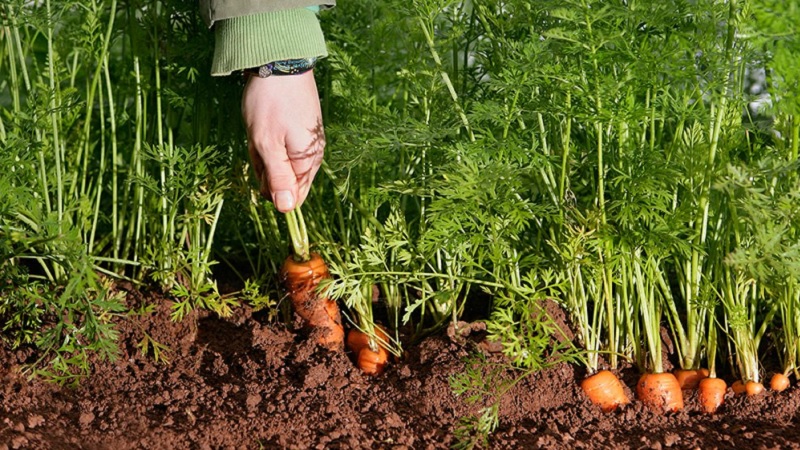
To grow tasty carrots suitable for long-term storage, with a maximum supply of nutrients, a number of conditions are observed:
- the culture is regularly watered, preventing the soil from completely drying out, moistening the soil to a depth of at least 25 cm with warm water;
- carefully select varieties suitable for a specific climatic region;
- do not fertilize plantings with manure - alternatively I use wood ash and compost;
- monitor the level of soil acidity (a suitable indicator is 5.5-5.6 pH);
- periodically loosen the earth to provide oxygen access to the roots;
- parts of carrots protruding above the surface are sprinkled with earth;
- ripe vegetables are picked in a timely manner.
Carrots are cultivated without the use of nitrates: they accumulate in the soil in large quantities, are actively absorbed by root crops along with other elements. This not only spoils the taste of vegetables, but also makes them poisonous.
Is it possible to eat such a carrot
The characteristic bitter taste of carrots can spoil the taste of the dish to which it is added. These vegetables are not always suitable for consumption. If they are spoiled due to an attack of pests or fungal diseases, they look lethargic or too hard, stiff, then it is better to destroy the entire batch.
If the bitterness appears only in the upper part of the vegetables, it is simply cut off. They get rid of the unpleasant taste in a simple way - by heat treatment, which kills all the substances that impart bitterness. After that, the carrots are suitable for frying, broths, preservation.
Tips & Tricks
The pleasant sweet taste of carrots is given by sugars, which are formed only with proper soil preparation. Increases sugar content by rejecting organic matter, in particular manure, which leads to deformation of root crops, the appearance in them of a characteristic iodine aftertaste.
A well-lit area is chosen for planting. Re-sow carrots in the same place no earlier than 3 years later. If necessary, the soil is lime before planting: 0.4-0.5 kg of lime is applied for each 1 m2 every 6-7 years, depending on the acidity level.
Carrots grow well in the area where the following crops were previously grown:
Do not forget about fertilizers. During the formation and growth of root crops, the culture is fed with nitroammophos (at the rate of 40 g per 10 l of water). In August, agents with boron and manganese are introduced, which improve the taste of vegetables and give them sugariness.
The tobacco mixture will protect the area from carrot flies. The agent is scattered between the beds when thinning. Onions are planted next to the beds from pests. To prevent insects from laying eggs, the soil is mulched with sawdust, coniferous litter, grass. It retains moisture, slows down the growth of weeds.
Conclusion
Growing tasty and nutritious carrots on your own plot is not that difficult. To do this, the rules of agricultural technology are observed: the crop is regularly watered, not fertilized with manure, the soil is loosened, the protruding parts of the root crops are sprinkled with earth, the harvest is collected on time.
The choice of a suitable variety, protection from pests, and a nutritious soil with low acidity are no less important.